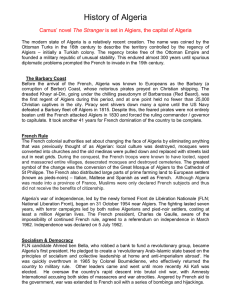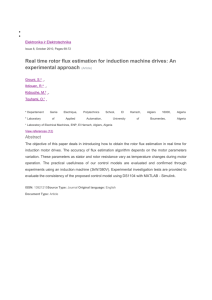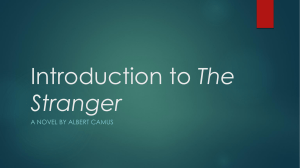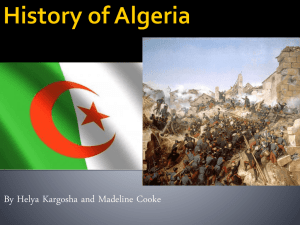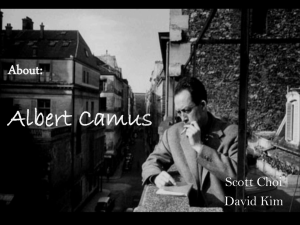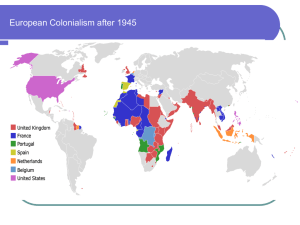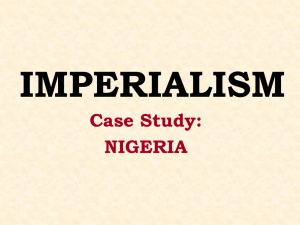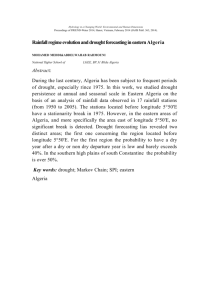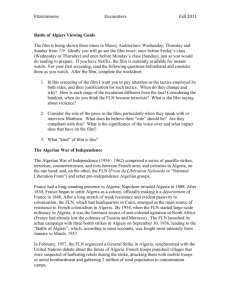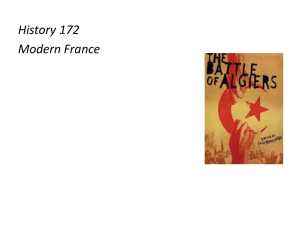mar_3_5
advertisement
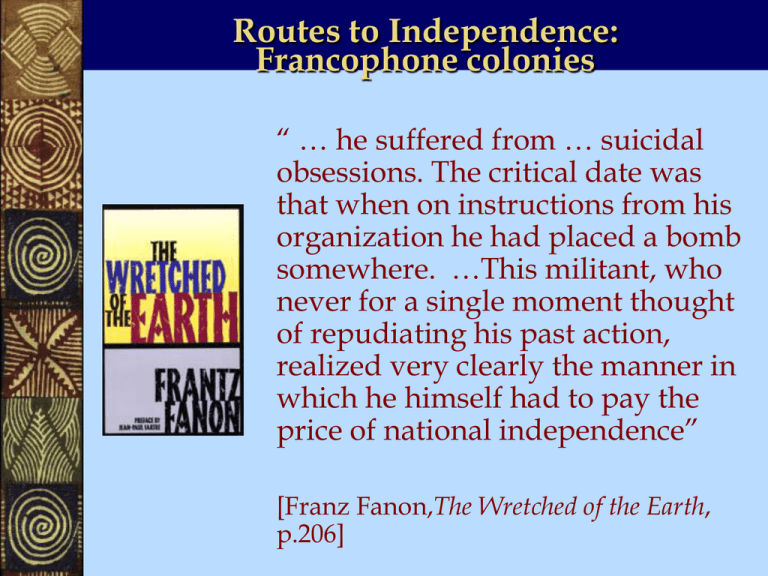
Routes to Independence: Francophone colonies “ … he suffered from … suicidal obsessions. The critical date was that when on instructions from his organization he had placed a bomb somewhere. …This militant, who never for a single moment thought of repudiating his past action, realized very clearly the manner in which he himself had to pay the price of national independence” [Franz Fanon,The Wretched of the Earth, p.206] WWII: Europe, Africa & the World - post-war world saw creation of United Nations (to replace League of Nations) - Increase in anti-colonial rhetoric (including Pan-Africanists) - independence in various Asian regions, especially India, had major impact on colonizers and colonized alike WWII: Europe, Africa & the World -Britain and France began speaking of ‘changes’ to colonialism (will look at Britain next week) - allowed formation of Workers’ Unions where previously illegal -United States and Soviet Union emerged strong from the war: - demanded access to colonial world - supported anti-colonialist movements The French Experience Post-war change came first in France: - left-leaning coalition (including Communist Party) immediately moved for change in colonial world. - 1946: Union Francaise created ‘commonwealth’ of French Colonies - 20 Africans to be elected representatives to French Assembly - others to serve in new Assembly for the Union Francophone Colonies: the 1950s To protect future influence established Communaute Francaise: - France continued to control finance (common currency), foreign policy, military affairs - local parliamentary government, flag, anthem devolved to ‘states’ Francohpone… 1950s (cont.) Reactions varied: - some not happy but felt Communaute gave time for weaker, poorer colonies to gain strength, therefore supported - others pleased to see small elite kept in positions of power - cultural reactions expressed in part by Leopold Senghor’s concept of negritude, ‘modern-conservatism’ -- ‘return to Mother Africa’ within larger French community Francophone…: the Referendum 1958: referendum on question of belonging to the Communaute: - de Gaulle made special tour of each colony preparing voters - maintained control over voting apparatus - “YES” vote meant continuing patronage of France – aid, military support, currency stability (the FWA, FEA franc tied to French franc) - “NO” meant withdrawal of all support Francophone…: Referendum (cont.) Every colony voted ‘yes’ – EXCEPT Guinea: - leader, Seku Toure strongly based in workers unions - Partie Democratique de Guinee won popular support - undermined authority traditional chiefs - 95% voters rejected the Communaute , opted for ‘real’ independence Francophone…: Referendum (cont.) - all aid immediately cut off - all French infrastructure that could be removed was – even telephones ripped off walls! Guinea reflected potential danger: if one colony could make it alone, how long before the others did the same? Algeria - other ‘exception’: settler colony of Algeria - already ‘province’ of France - ‘decolonizing’ process not applicable (from perspective of France) - ‘anachronism’ in decolonizing world (from perspective of ‘Arab’Algerians Algeria Algeria representative of most settler colonies: - resistance to continuing colonial rule led to full scale wars, often civil wars - ideology played key roles and therefore… - … had direct implications for international interests (Cold War) - had significant impact on ‘home’ colonial society as well as colony Algeria Algeria part of France: -‘Algerie Francaise’ since 1830 - French settlers: ‘pieds noirs’ or ‘colons’ - 1950s Algerians struggling against two ‘layers’ colonizers who would not negotiate - war for independence lasted 1954-1962 - Algeria’s battle critical to struggle of West African French colonies Algeria Algeria: -oldest colony; climate, land attracted 1 million, settlers (among 7 million Algerians) - 1950 held 23% best land -colons saw Algeria as part of France -part of French metropolis except better policed, more military presence -Algerian workers moved in, out of France - fewer racial tensions than other settler regimes (eg Kenya) Algeria c.1950 (cont.) Unlike West, East Africa, Algeria not part of post-war discussions of decolonization: - but had educated elite, nationalists, representing same range of positions -differed by being part of larger Arab, Muslim ‘nationalist’ movement - strong across North Africa, rooted in Egypt - drew on ideology not contained or defined by colony or regional ethnicity: Islam Algeria c.1950 (cont.) France: - Gaullist party became powerful after 1951 elections -aligned with colons’ interests - openly repressed local inhabitants Algeria, Morocco, Tunisia - Last two colonies turned to United Nations to censure French policies: failed - French position hardened in face of ‘external’ interference Algeria c. 1950 (cont.) Resistance in Algeria led by Front de Liberation National(FLN) - guerilla warfare and terrorism in both countryside and cities - key battles in capital of Algiers War in Countryside Peasants fleeing War (left) Prisoner of War, farmer’s pig shed (right) War in Algiers City Street Barricade. “Vive Massu” (reference to General Massu who led Parachute Troops and brought about end to battle of Algiers through terrorism and torture) Video The Battle of Algiers (made in France, 1967 – reissued 2003) [excerpt] F.L.N. and its Ideology Role of Islam as ‘ideology’: - Islam played large role in defining who was ‘with’ who was not ‘with’ movement -seen by French as synonymous with: resistance being ‘Arab’ terrorism - bred ‘terrorism’ among French in return Impact on Combatants “the Arab, permanently an alien in his own country, lives in a state of absolute depersonalization. . . . The events in Algeria are the logical consequence of an abortive attempt to decerebralize a people" (Fanon, Toward the African Revolution 53). Impact on Combatants -The French and those who fought as French troops also scarred by war [see ‘Senegalese Soldier in Algeria’ in Additional readings] - ‘total war’ in Algeria: everyone played a role [reference ‘Battle of Algiers’ video excerpt showed in class Mar 3] Struggle not confined to Algiers Struggle neither began nor ended in Algiers: -‘Battle of Algiers’ lasted three years (1954-7) - ‘Battle of Algeria’ lasted seven F.L.N. and the Wider World North Africa support strong, especially Egypt (‘Radio Caire’): - angered French and British - Nasser (power 1954) initially seen as positive in terms of controlling panIslamicism - 1956: nationalized Suez Canal, provoked major debacle for western powers F.L.N and the Wider World Marked turning point for France: -parachute troops to Algiers - leader (Massu) brought experience of IndoChine (Vietnam) - urban guerilla war met new terrorism, torture F.L.N. (cont) ‘impact’ of the war in France: - left, liberals ‘uncomfortable’ with infringements on human rights - 1956 articles and ‘dialogues’ appearing in major public venues like Paris-Match F.L.N. (cont) Attracted attention in US: -1957 Kennedy demanded discussion in UN - 1958 France surveillance tracked FLN to Tunisian village: air bombed it - US, Britain pushed for negotiations Air War Dropping Napalm Impact on France International embarrassment: - dissension in military, economic doubts - all challenged holding on to ‘Algerie Francais’ - not enough to dislodge entrenched interests, boosted by victory in Algiers Impact on France May 1958: - demonstration in Algiers led to formation “Committee of Public Safety” - Fear military coup directed from Algiers led to constitutional transfer of power in Paris: de Gaulle called from retirement Impact on France (cont.) “Je vous ai compris!” De Gaulle said to: - the colons - the Algerian francophiles - the military: What did that mean? Impact on France (cont.) - De Gaulle convinced of decolonization - believed in modernization of country, ‘nuclearization’ of defense system - tried to keep nuclear test sites in Sahara (a test had taken place in 1960), some oil and gas holdings but… - by 1961, willing to negotiate the nonnegotiable… and with the FLN! De Gaulle Decolonizes 1959 he spoke of ‘self determination’ 1960 of an ‘Algerian Algeria’ 1961 of a ‘sovereign Algeria’ In 1962: “We must concede these details rather than reject an agreement; for there is no comparison between the primary interest, which consists of reaching an agreement, and the secondary interest, which consists of holding a little longer certain things which in any case we do not reckon to hold for ever!” [cited in Feildhouse, Decolonization in Africa, 2nd ed., p.185] De Gaulle Decolonizes - Attempts to assure colons, military and Algerians who believed assimilation that France would not abandon them failed - 1961-2 constant unrest, plots to assassinate de Gaulle threatened to undermine France itself -1962 meetings at Evian, France with FLN led to agreement which was, only a few years earlier, unthinkable: negotiated independence for Algeria De Gaulle Decolonizes Agreement: - France promised ‘co-operation’ (financial assistance) to help rebuild after 8 years of war - FLN promised to ‘protect’ remaining colons - offer them choice of citizenship after 3 years De Gaulle Decolonizes But undermined: - flight of most settlers with skills, capital threatened economy - FLN factions threatened political stability Independence
